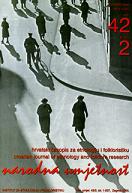Zmaj i junak ili kako ubiti zmaja na primjeru međimurskih predaja o grabancijašu i pozoju
Dragon and Hero or How to Kill a Dragon on the Example of the Legends of Međimurje about the Grabancijaš and the Dragon
Author(s): Suzana MarjanićSubject(s): Customs / Folklore
Published by: Institut za etnologiju i folkloristiku
Keywords: myth; oral legend; legend; ecofeminism; Dragon
Summary/Abstract: In this article, through interpretation of Medimurean legends about the Čakovec Dragon (Pozoj), the differential determinant is emphasised in relation to the proto-Slavic legend's final status of the dragon (living status / cosmic renewal – dead status), in the legend of the Čakovec Dragon and, finally, in the legend of St George, who kills the Dragon. In other words, Christianity enthrones the single instance liquidation of the Dragon, while in the Indo- European myth on the conflict between, for example, Indra and the so-called Cosmic Monster (V tra, Vala) the Serpent / Dragon, it is a matter of cyclical slaughter. It is to this group – the group of cosmic dragons – to which the Medimurean dragons belong, although it is obvious that legends about the Pozoj, or Dragon, were superseded by the Christian legend of the Dragon-Slayer, with permanent overpowering of the so-called Monster, since the Grabancija in the south, east or even west of the Globe (or, as Andrija Dolencic says in the Indian butcher shops) finally kills the Pozoj – and sells its meat, which means that the Cosmic Cycle, that is, repetition, has been discontinued. In conclusion, the Medimurean legends of the meteorological binomial, consisting of the Grabancija and the Pozoj, are interpreted using the ecofeminist key as legends in which an effort is made to conceal embarrassing historical truths (Christianisation, colonialism). Namely, the legend of the Čakovec Dragon – as is the case with all similar legends of the vanquishing of so-called monsters, demonstrates what Barthes differentiated in mythic structure; that the myth can be very simply modified into a tool of political demagogy that confers a "natural" appearance upon a particular ideology. True enough, the case of the legend of the Čakovec Dragon is a weak myth, which Barthes denotes in relation to the strong myth, in which the political quantum is direct, and depolitisation abrupt, as a myth in which the political quality of the subject has been lost, while adding that a trifle can abruptly revive it once again. Needless to say, trifles are not at all unimportant.
Journal: Narodna umjetnost - Hrvatski časopis za etnologiju i folkloristiku
- Issue Year: 46/2009
- Issue No: 2
- Page Range: 11-36
- Page Count: 26
- Language: Croatian

